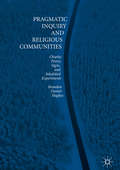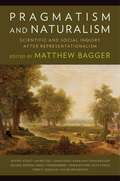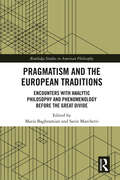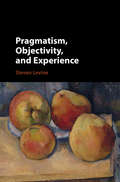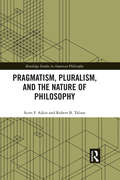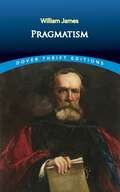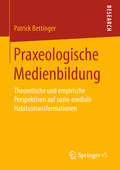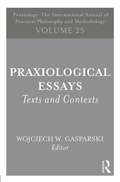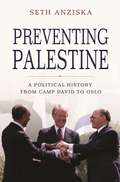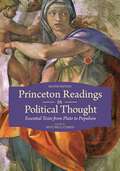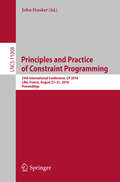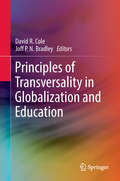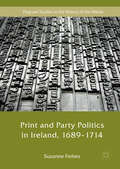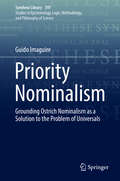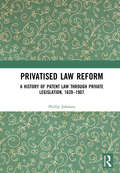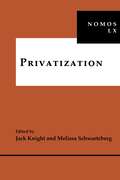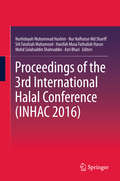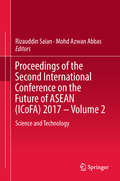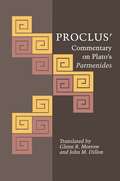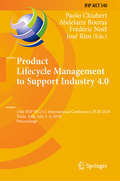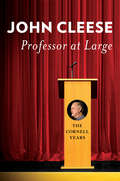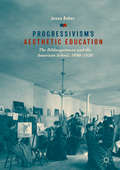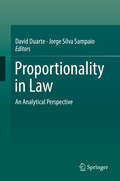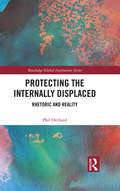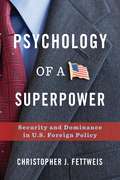- Table View
- List View
Pragmatic Inquiry and Religious Communities: Charles Peirce, Signs, and Inhabited Experiments
by Brandon Daniel-HughesThis book examines the ways in which religious communities experimentally engage the world and function as fallible inquisitive agents, despite frequent protests to the contrary. Using the philosophy of inquiry and semiotics of Charles Sanders Peirce, it develops unique naturalist conceptions of religious meaning and ultimate orientation while also arguing for a reappraisal of the ways in which the world’s venerable religious traditions enable novel forms of communal inquiry into what Peirce termed “vital matters.” Pragmatic inquiry, it argues, is a ubiquitous and continuous phenomenon. Thus, religious participation, though cautiously conservative in many ways, is best understood as a variety of inhabited experimentation. Religious communities embody historically mediated hypotheses about how best to engage the world and curate networks of semiotic resources for rendering those engagements meaningful. Religions best fulfill their inquisitive function when they both deploy and reform their sign systems as they learn better to engage reality.
Pragmatism and Naturalism: Scientific and Social Inquiry After Representationalism
by Scott Davis Jeffrey Stout Philip Kitcher Wayne Proudfoot Matthew C. Bagger Professor Nancy Frankenberry Terry Godlove Jonathon Kahn Michael Raposa Jim WetzelMost contemporary philosophers would call themselves naturalists, yet there is little consensus on what naturalism entails. Long signifying the notion that science should inform philosophy, debates over naturalism often hinge on how broadly or narrowly the terms nature and science are defined. The founding figures of American Pragmatism—C. S. Peirce (1839–1914), William James (1842–1910), and John Dewey (1859–1952)—developed a distinctive variety of naturalism by rejecting reductive materialism and instead emphasizing social practices. Owing to this philosophical lineage, pragmatism has made original and insightful contributions to the study of religion as well as to political theory.In Pragmatism and Naturalism, distinguished scholars examine pragmatism’s distinctive form of nonreductive naturalism and consider its merits for the study of religion, democratic theory, and as a general philosophical orientation. Nancy Frankenberry, Philip Kitcher, Wayne Proudfoot, Jeffrey Stout, and others evaluate the contribution pragmatism can make to a viable naturalism, explore what distinguishes pragmatic naturalism from other naturalisms on offer, and address the pertinence of pragmatic naturalism to methodological issues in the study of religion. In parts dedicated to historical pragmatists, pragmatism in the philosophy and the study of religion, and pragmatism and democracy, they display the enduring power and contemporary relevance of pragmatic naturalism.
Pragmatism and the European Traditions: Encounters with Analytic Philosophy and Phenomenology before the Great Divide (Routledge Studies in American Philosophy)
by Sarin Marchetti Maria BaghramianThe turn of the twentieth century witnessed the birth of two distinct philosophical schools in Europe: analytic philosophy and phenomenology. The history of 20th-century philosophy is often written as an account of the development of one or both of these schools, as well as their overt or covert mutual hostility. What is often left out of this history, however, is the relationship between the two European schools and a third significant philosophical event: the birth and development of pragmatism, the indigenous philosophical movement of the United States. Through a careful analysis of seminal figures and central texts, this book explores the mutual intellectual influences, convergences, and differences between these three revolutionary philosophical traditions. The essays in this volume aim to show the central role that pragmatism played in the development of philosophical thought at the turn of the twentieth century, widen our understanding of a seminal point in the history of philosophy, and shed light on the ways in which these three schools of thought continue to shape the theoretical agenda of contemporary philosophy.
Pragmatism, Objectivity, and Experience
by Steven LevineIn this book Steven Levine explores the relation between objectivity and experience from a pragmatic point of view. Like many new pragmatists he aims to rehabilitate objectivity in the wake of Richard Rorty's rejection of the concept. But he challenges the idea, put forward by pragmatists like Robert Brandom, that objectivity is best rehabilitated in communicative-theoretic terms - namely, in terms that can be cashed out by capacities that agents gain through linguistic communication. Levine proposes instead that objectivity is best understood in experiential-theoretic terms. He explains how, in order to meet the aims of the new pragmatists, we need to do more than see objectivity as a norm of rationality embedded in our social-linguistic practices; we also need to see it as emergent from our experiential interaction with the world. Innovative and carefully argued, this book redeems and re-actualizes for contemporary philosophy a key insight developed by the classical pragmatists.
Pragmatism, Pluralism, and the Nature of Philosophy (Routledge Studies in American Philosophy)
by Robert B. Talisse Scott F. AikinFor the past fifteen years, Aikin and Talisse have been working collaboratively on a new vision of American pragmatism, one which sees pragmatism as a living and developing philosophical idiom that originates in the work of the "classical" pragmatisms of Charles Peirce, William James, and John Dewey, uninterruptedly develops through the later 20th Century pragmatists (C. I. Lewis, Wilfrid Sellars, Nelson Goodman, W. V. O. Quine), and continues through the present day. According to Aikin and Talisse, pragmatism is fundamentally a metaphilosophical proposal – a methodological suggestion for carrying inquiry forward amidst ongoing deep disagreement over the aims, limitations, and possibilities of philosophy. This conception of pragmatism not only runs contrary to the dominant self-understanding among cotemporary philosophers who identify with the classical pragmatists, it also holds important implications for pragmatist philosophy. In particular, Aikin and Talisse show that their version of pragmatism involves distinctive claims about epistemic justification, moral disagreement, democratic citizenship, and the conduct of inquiry. The chapters combine detailed engagements with the history and development of pragmatism with original argumentation aimed at a philosophical audience beyond pragmatism.
Pragmatism: A New Name For Some Old Ways Of Thinking (Dover Thrift Editions)
by William JamesA profoundly influential figure in American psychology, William James (1842–1910) was also a philosopher of note, who used Charles S. Peirce's theories of pragmatism as a basis for his own conception of that influential philosophy. For James, this meant an emphasis on "radical empiricism" and the concept that the meaning of any idea — philosophical, political, social, or otherwise — has validity only in terms of its experiential and practical consequences. <P><P> James propounded his theories of pragmatism in this book, one of the most important in American philosophy. In a sense, he wished to test competing systems of thought in the "marketplace of actual experience" to determine their validity, i.e. whether adopting a particular philosophical theory or way of looking at the world makes an actual difference in individual conduct or in how we perceive and react to the varieties of experience. In these pages, James not only makes a strong case for his own ideas, but mounts a powerful attack against the transcendental and rationalist tradition. <P><P> For anyone interested in William James or the history of American philosophical thought, Pragmatism is an essential and thought provoking reference. In this handy, inexpensive edition, it will challenge and stimulate any thinking person.
Praxeologische Medienbildung: Theoretische und empirische Perspektiven auf sozio-mediale Habitustransformationen
by Patrick BettingerIn diesem Buch werden Aspekte einer praxeologisch ausgerichteten und empirisch fundierten Medienbildungstheorie skizziert, die das Zusammenspiel von Menschen und medialen Artefakten in Bildungsprozessen eingehend beleuchten. Medienbildung wird hierbei als ein Transformationsprozess verstanden, der sich durch das Wechselverhältnis von personalem Habitus und ‚Quasi-Habitus’ medialer Artefakte auszeichnet. Anhand einer fallübergreifenden Perspektive auf Grundlage der dokumentarischen Analyse biografisch-narrativer Interviews sowie medialer Artefakte werden drei Varianten sozio-medialer Habituskonfigurationen identifiziert, die Bildungsprozesse in jeweils spezifischer Weise prägen.
Praxiological Essays: Texts and Contexts (Praxiology)
by Wojciech W. GasparskiThe 25th volume in the series Praxiology: The International Annual of Practical Philosophy and Methodology brings a praxiological perspective to current issues facing our society. In sixteen brand-new essays, a team of international scholars expands praxiology beyond the borders of its historically philosophical application and uses it to address real-world problems in a variety of fields. The volume outlines new approaches and reflections on traditional praxiological method, and then applies these developments as tools in fields as diverse as ethics, psychology, sociology, economics, management, and entrepreneurship. Grounded in the tradition of the Polish praxiologist Tadeusz Kotarbiński (1886-1981), the 25th volume, entitled Praxiological Essays: Texts and Contexts, highlights the rich mosaic of issues perceived in the practice of human action, and carries a tradition of Praxiological inquiry forward into our contemporary philosophy, methodology, and social sciences.
Preventing Palestine: A Political History from Camp David to Oslo
by Seth AnziskaOn the fortieth anniversary of the Camp David Accords, a groundbreaking new history that shows how Egyptian-Israeli peace ensured lasting Palestinian statelessnessFor seventy years Israel has existed as a state, and for forty years it has honored a peace treaty with Egypt that is widely viewed as a triumph of U.S. diplomacy in the Middle East. Yet the Palestinians—the would-be beneficiaries of a vision for a comprehensive regional settlement that led to the Camp David Accords in 1978—remain stateless to this day. How and why Palestinian statelessness persists are the central questions of Seth Anziska’s groundbreaking book, which explores the complex legacy of the agreement brokered by President Jimmy Carter.Based on newly declassified international sources, Preventing Palestine charts the emergence of the Middle East peace process, including the establishment of a separate track to deal with the issue of Palestine. At the very start of this process, Anziska argues, Egyptian-Israeli peace came at the expense of the sovereignty of the Palestinians, whose aspirations for a homeland alongside Israel faced crippling challenges. With the introduction of the idea of restrictive autonomy, Israeli settlement expansion, and Israel’s 1982 invasion of Lebanon, the chances for Palestinian statehood narrowed even further. The first Intifada in 1987 and the end of the Cold War brought new opportunities for a Palestinian state, but many players, refusing to see Palestinians as a nation or a people, continued to steer international diplomacy away from their cause.Combining astute political analysis, extensive original research, and interviews with diplomats, military veterans, and communal leaders, Preventing Palestine offers a bold new interpretation of a highly charged struggle for self-determination.
Princeton Readings in Political Thought: Essential Texts since Plato - Revised and Expanded Edition
by Mitchell CohenA thoroughly updated and substantially expanded edition of an acclaimed anthologyThis is a thoroughly updated and substantially expanded new edition of one of the most popular, wide-ranging, and engaging anthologies of Western political thinking, one that spans from antiquity to the twenty-first century. In addition to the majority of the pieces that appeared in the original edition, this new edition features exciting new selections from more recent thinkers who address vital contemporary issues, including identity, cosmopolitanism, global justice, and populism. Organized chronologically, the anthology brings together a fascinating array of writings--including essays, book excerpts, speeches, and other documents—that have indelibly shaped how politics and society are understood. Each chronological section and thinker is presented with a brief, lucid introduction, making this a valuable reference as well as reader. A thoroughly updated and substantially expanded edition of an acclaimed anthology of political thoughtFeatures a wide range of thinkers, including Thucydides, Plato, Aristotle, Cicero, Augustine, Aquinas, Christine de Pizan, Machiavelli, Luther, Calvin, Hobbes, Spinoza, Locke, Swift, Hume, Rousseau, Adam Smith, Jefferson, Burke, Olympes de Gouges, Wollstonecraft, Kant, Hegel, Bentham, Mill, de Tocqueville, Frederick Douglass, Lincoln, Marx, Nietzsche, Lenin, John Dewey, Gaetano Mosca, Roberto Michels, Weber, Emma Goldman, Freud, Einstein, Mussolini, Arendt, Hayek, Franklin D. Roosevelt, T. H. Marshall, Orwell, Leo Strauss, de Beauvoir, Fanon, Martin Luther King Jr., Malcolm X, Havel, Fukuyama, Mitchell Cohen, Habermas, Foucault, Rawls, Nozick, Walzer, Iris Marion Young, Martha Nussbaum, Peter Singer, Amartya Sen, and Jan-Werner MüllerIncludes brief introductions for each thinker
Principles and Practice of Constraint Programming: 24th International Conference, Cp 2018, Lille, France, August 27-31, 2018, Proceedings (Lecture Notes in Computer Science #11008)
by John HookerThis book constitutes the proceedings of the 24th International Conference on Principles and Practice of Constraint Programming, CP 2018, held in Lille, France, in August 2018.The 41 full and 9 short papers presented in this volume were carefully reviewed and selected from 114 submissions. They deal with all aspects of computing with constraints including theory, algorithms, environments, languages, models, systems, and applications such as decision making, resource allocation, scheduling, configuration, and planning. The papers were organized according to the following topics/tracks: main technical track; applications track; CP and data science; CP and music; CP and operations research; CP, optimization and power system management; multiagent and parallel CP; and testing and verification.
Principles of Transversality in Globalization and Education
by David R. Cole Joff P.N. BradleyThis unique book comprehensively covers the evolving field of transversality, globalization and education, and presents creative, research-based thought experiments that seek to unravel the forces of globalization impacting education. Pursuing various approaches to and uses of transversality, with a focus on the ideas of Félix Guattari, it is the only book of its kind. Specifically, it examines the influence of Guattari at the forefront of educational research that addresses, enhances and sets free activist micro-perspectives, which can counter macro-global movements, such as capitalism and climate change. This book is a global education research text that includes perspectives from four continents, providing a balanced and significant work on globalization in education.
Print and Party Politics in Ireland, 1689-1714 (Palgrave Studies in the History of the Media)
by Suzanne ForbesThis book is the first full-length study of the development of Irish political print culture from the Glorious Revolution of 1688-9 to the advent of the Hanoverian succession in 1714. Based on extensive analysis of publications produced in Ireland during the period, including newspapers, sermons and pamphlet literature, this book demonstrates that print played a significant role in contributing to escalating tensions between tory and whig partisans in Ireland during this period. Indeed, by the end of Queen Anne’s reign the public were, for the first time in an Irish context, called upon in printed publications to make judgements about the behaviour of politicians and political parties and express their opinion in this regard at the polls. These new developments laid the groundwork for further expansion of the Irish press over the decades that followed.
Priority Nominalism: Grounding Ostrich Nominalism as a Solution to the Problem of Universals (Synthese Library #397)
by Guido ImaguireThis monograph details a new solution to an old problem of metaphysics. It presents an improved version of Ostrich Nominalism to solve the Problem of Universals. This innovative approach allows one to resolve the different formulations of the Problem, which represents an important meta-metaphysical achievement.In order to accomplish this ambitious task, the author appeals to the notion and logic of ontological grounding. Instead of defending Quine’s original principle of ontological commitment, he proposes the principle of grounded ontological commitment. This represents an entirely new application of grounding.Some metaphysicians regard Ostrich Nominalism as a rejection of the problem rather than a proper solution to it. To counter this, the author presents solutions for each of the formulations. These include: the problem of predication, the problem of abstract reference, and the One Over Many as well as the Many Over One and the Similar but Different variants.This book will appeal to anyone interested in contemporary metaphysics. It will also serve as an ideal resource to scholars working on the history of philosophy. Many will recognize in the solution insights resembling those of traditional philosophers, especially of the Middle Ages.
Privatised Law Reform: A History Of Patent Law Through Private Legislation, 1620-1907
by Phillip JohnsonIn the history of British patent law, the role of Parliament is often side-lined. This is largely due to the raft of failed or timid attempts at patent law reform. Yet there was another way of seeking change. By the end of the nineteenth century, private legislation had become a mechanism or testing ground for more general law reforms. The evolution of the law had essentially been privatised and was handled in the committee rooms in Westminster. This is known in relation to many great industrial movements such as the creating of railways, canals and roads, or political movements such as the powers and duties of local authorities, but it has thus far been largely ignored in the development of patent law. This book addresses this shortfall and examines how private legislation played an important role in the birth of modern patent law.
Privatization: NOMOS LX (NOMOS - American Society for Political and Legal Philosophy #29)
by Melissa SchwartzbergA distinguished group of scholars explore the moral values and political consequences of privatization The 21st century has seen a proliferation of privatization across industries in the United States, from security and the military to public transportation and infrastructure. In shifting control from the state to private actors, do we weaken or strengthen structures of governance? Do state-owned enterprises promise to be more equal and fair than their privately-owned rivals? What role can accountability measures play in mediating the effects of privatization; and what role does coercion play in the state governance and control? In this latest installment from the NOMOS series, an interdisciplinary group of distinguished scholars in political science, law, and philosophy examine the moral and political consequences of transferring state-provided or state-owned goods and services to the private sector. The essays consider how we should evaluate the decision to privatize, both with respect to the quality of outcomes that might be produced, and in terms of the effects of privatization on the core values underlying democratic decision-making. Privatization also affects the structure of governance in a variety of important ways, and these essays evaluate the consequences of privatization on the state. Privatization sheds new light on these highly salient questions of contemporary political life and institutional design.
Proceedings of the 3rd International Halal Conference (INHAC #2016)
by Nurhidayah Muhammad Hashim Nur Nafhatun Md Shariff Siti Fatahiah Mahamood Hanifah Musa Fathullah Harun Mohd Solahuddin Shahruddin Azri BhariThis book contains selected papers which were presented at the 3rd International Halal Conference (INHAC 2016), organized by the Academy of Contemporary Islamic Studies (ACIS), Universiti Teknologi MARA (UiTM) Shah Alam, Malaysia. It addresses halal-related issues that are applicable to various industries and explores a variety of contemporary and emerging issues. Highlighting findings from both scientific and social research studies, it enhances the discussion on the halal industry (both in Malaysia and at the international level), and serves as an invitation to engage in more advanced research on the global halal industry.
Proceedings of the Second International Conference on the Future of ASEAN (ICoFA) 2017 – Volume 2: Science And Technology
by Rizauddin Saian Mohd Azwan AbbasThis book examines how business, the social sciences, science and technology will impact the future of ASEAN. Following the ASEAN VISION 2020, it analyses the issues faced by ASEAN countries, which are diverse, while also positioning ASEAN as a competitive entity through partnerships. On the 30th anniversary of ASEAN, all ASEAN leaders agreed to the establishment of the ASEAN VISION 2020, which delineates the formation of a peaceful, stable and dynamically developed region while maintaining a community of caring societies in Malaysia, Indonesia, Singapore, Brunei, Vietnam, Thailand, the Philippines, Myanmar, Laos and Cambodia. In keeping with this aspiration, Universiti Teknologi MARA Perlis took the initial steps to organise conferences and activities that highlight the role of the ASEAN region. The Second International Conference on the Future of ASEAN (ICoFA) 2017 was organised by the Office of Academic Affairs, Universiti Teknologi MARA Perlis, to promote more comprehensive integration among ASEAN members. This book, divided into two volumes, offers a useful guide for all those engaged in research on business, the social sciences, science and technology. It will also benefit researchers worldwide who want to gain more knowledge about ASEAN countries
Proclus' Commentary on Plato's Parmenides
by ProclusThis is the first English translation of Proclus' commentary on Plato'sParmenides. Glenn Morrow's death occurred while he was less than halfway through the translation, which was completed by John Dillon. A major work of the great Neoplatonist philosopher, the commentary is an intellectual tour de force that greatly influenced later medieval and Renaissance thought. As the notes and introductory summaries explain, it comprises a full account of Proclus' own metaphysical system, disguised, as is so much Neoplatonic philosophy, in the form of a commentary.
Product Lifecycle Management to Support Industry 4.0: 15th Ifip Wg 5. 1 International Conference, Plm 2018, Turin, Italy, July 2-4, 2018, Proceedings (IFIP Advances in Information and Communication Technology #540)
by Abdelaziz Bouras José Ríos Paolo Chiabert Frédéric NoëlThis book constitutes the refereed post-conference proceedings of the 15th IFIP WG 5.1 International Conference on Product Lifecycle Management, PLM 2018, held in Turin, Spain, in July 2018.The 72 revised full papers presented were carefully reviewed and selected from 82 submissions. The papers are organized in the following topical sections: building information modeling; collaborative environments and new product development; PLM for digital factories and cyber physical systems; ontologies and data models; education in the field of industry 4.0; product-service systems and smart products; lean organization for industry 4.0; knowledge management and information sharing; PLM infrastructure and implementation; PLM maturity, implementation and adoption; 3D printing and additive manufacturing; and modular design and products and configuration and change management.
Professor at Large: The Cornell Years
by John CleeseAnd now for something completely different. Professor at Large features beloved English comedian and actor John Cleese in the role of Ivy League professor at Cornell University. His almost twenty years as professor-at-large has led to many talks, essays, and lectures on campus. This collection of the very best moments from Cleese under his mortarboard provides a unique view of his endless pursuit of intellectual discovery across a range of topics. Since 1999, Cleese has provided Cornell students and local citizens with his ideas on everything from scriptwriting to psychology, religion to hotel management, and wine to medicine.His incredibly popular events and classes—including talks, workshops, and an analysis of A Fish Called Wanda and The Life of Brian—draw hundreds of people. He has given a sermon at Sage Chapel, narrated Prokofiev's Peter and the Wolf with the Cornell Chamber Orchestra, conducted a class on script writing, and lectured on psychology and human development. Each time Cleese has visited the campus in Ithaca, NY, he held a public presentation, attended and or lectured in classes, and met privately with researchers. From the archives of these visits, Professor at Large includes an interview with screenwriter William Goldman, a lecture about creativity entitled, "Hare Brain, Tortoise Mind," talks about Professor at Large and The Life of Brian, a discussion of facial recognition, and Cleese's musings on group dynamics with business students and faculty.Professor at Large provides a window into the workings of John Cleese's scholarly mind, showcasing the wit and intelligence that have driven his career as a comedian, while demonstrating his knack of pinpointing the essence of humans and human problems. His genius on the screen has long been lauded; now his academic chops get their moment in the spotlight, too.
Progressivism's Aesthetic Education: The Bildungsroman and the American School, 1890–1920
by Jesse RaberDuring the Progressive Era in the United States, as teaching became professionalized and compulsory attendance laws were passed, the public school emerged as a cultural authority. What did accepting this authority mean for Americans’ conception of self-government and their freedom of thought? And what did it mean for the role of artists and intellectuals within democratic society? Jesse Raber argues that the bildungsroman negotiated this tension between democratic autonomy and cultural authority, reprising an old role for the genre in a new social and intellectual context. Considering novels by Abraham Cahan, Willa Cather, and Charlotte Perkins Gilman alongside the educational thought of John Dewey, the Montessorians, the American Herbartians, and the social efficiency educators, Raber traces the development of an aesthetics of social action. Richly sourced and vividly narrated, this book is a creative intervention in the fields of literary criticism, pragmatic philosophy, aesthetic theory, and the history of education.
Proportionality in Law: An Analytical Perspective
by David Duarte Jorge Silva SampaioThis book addresses the principle of proportionality, which is currently one of the most important instruments of judicial review, from both analytical and theory of law perspectives. As such, the analysis provided is far more comprehensive and can be applied to all areas of law, not just constitutional law. On the one hand, the volume offers a broad perspective on several aspects related to proportionality, such as its structure, the balancing methodology and the distinction between rules and principles. On the other, it provides an innovative, normativist and analytical approach to proportionality, helping readers understand its structure and behaviour.
Protecting the Internally Displaced: Rhetoric and Reality (Global Institutions)
by Phil OrchardToday, there are over 40 million conflict-induced internally displaced persons (IDPs) globally, almost double the number of refugees. Yet, IDPs are protected only by the soft-law Guiding Principles on Internal Displacement at the global level. Instead of a dedicated international organization, IDPs receive protection and assistance only through the UN’s cluster approach. Orchard argues that while an international IDP protection regime exists, many aspects of it are informal, with IDP issues bound up in a humanitarian regime complex that divides the mandates of key organizations and even the question of IDP status itself. While the Guiding Principles mark an important step forward, implementation of laws and policies based on them at the domestic level remains haphazard. Action at the international level similarly reflects an all-too-often ad hoc approach to IDP issues. Through an in-depth examination of IDP efforts at the international level and across the forty states which have adopted IDP laws and policies, Orchard argues that while progress has been made, new and greater monitoring and accountability mechanisms at both the domestic and international levels are critical. This work will be valuable to scholars, students, and practitioners of forced migration, international relations theory, and the Responsibility to Protect doctrine.
Psychology of a Superpower: Security and Dominance in U.S. Foreign Policy
by Christopher FettweisWith the collapse of the Soviet Union, the United States was left as the world’s sole superpower, which was the dawn of an international order known as unipolarity. The ramifications of imbalanced power extend around the globe—including the country at the center. What has the sudden realization that it stands alone atop the international hierarchy done to the United States? In Psychology of a Superpower, Christopher J. Fettweis examines how unipolarity affects the way U.S. leaders conceive of their role, make strategy, and perceive America’s place in the world.Combining security, strategy, and psychology, Fettweis investigates how the idea of being number one affects the decision making of America’s foreign-policy elite. He examines the role the United States plays in providing global common goods, such as peace and security; the effect of the Cold War’s end on nuclear-weapon strategy and policy; the psychological consequences of unbalanced power; and the grand strategies that have emerged in unipolarity. Drawing on psychology’s insights into the psychological and behavioral consequences of unchecked power, Fettweis brings new insight to political science’s policy-analysis toolkit. He also considers the prospect of the end of unipolarity, offering a challenge to widely held perceptions of American indispensability and asking whether the unipolar moment is worth trying to save. Psychology of a Superpower is a provocative rethinking of the risks and opportunities of the global position of the United States, with significant consequences for U.S. strategy, character, and identity.
